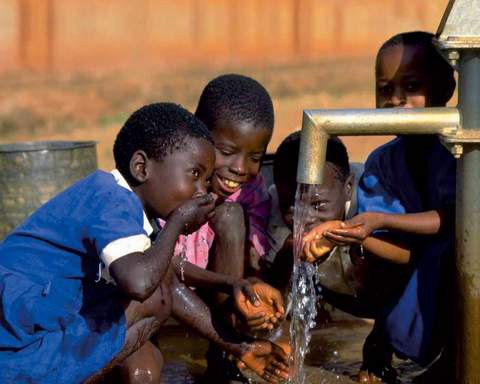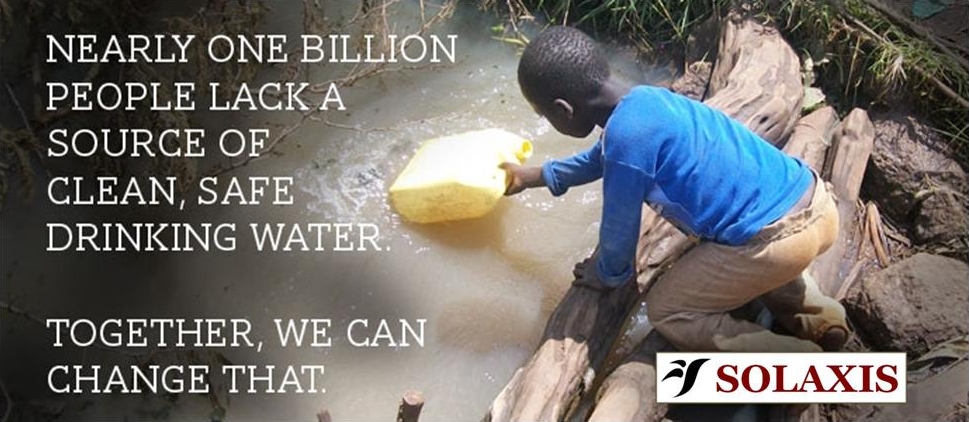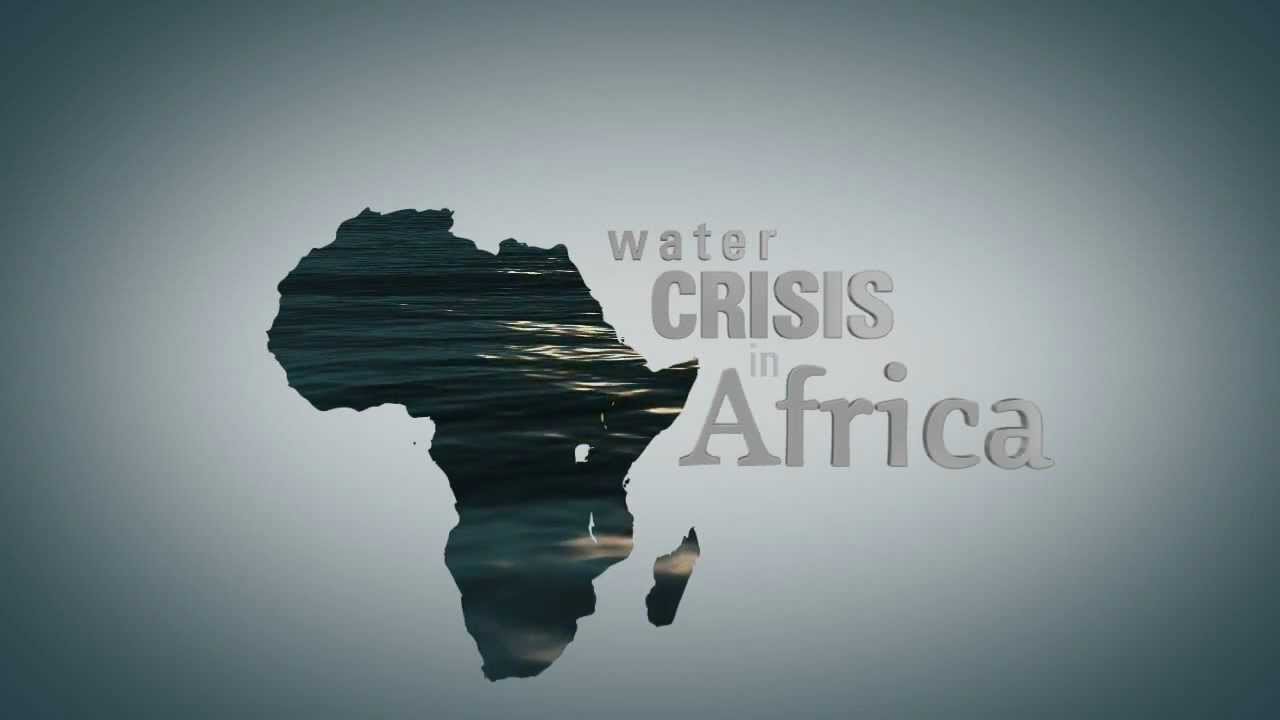Water treatment :
Solaxis uses our skills in Solar energy to power our various kinds of water and waste water treatment for Africa. Our partners like Aquel Bohemia has many modules for water treatment ranging from few litres of drinking water for a single home to thousands of metric tons for cities and villages.
Water and Wastewater Treatment Plant Operations we do at Solaxis
Our Trained operators operate the equipment in water and wastewater treatment plants in order to purify drinking water, remove domestic and industrial pollutants and solids from the water, and return clean water back to people and animals that need it and biosolids and air back to the environment.
Clean, safe water is essential for life and good health. Water and wastewater treatment plants remove impurities, solids, organisms, chemicals, and toxins from water and wastewater so that it is safe for people, animals, and the environment.
Solaxis Water plants treat water and distribute it to customers in various packages, bottles etc.
 Solaxis Wastewater plants return the cleaned water to rivers, lakes, and oceans. Using modern technology, water and wastewater treatment plants help provide clean water for use in homes and industries, help prevent disease, protect fish and wildlife from pollution, and protect the environment.
Solaxis Wastewater plants return the cleaned water to rivers, lakes, and oceans. Using modern technology, water and wastewater treatment plants help provide clean water for use in homes and industries, help prevent disease, protect fish and wildlife from pollution, and protect the environment.
Water and wastewater treatment plant operators run the equipment and control the processes that clean and treat water and wastewater at treatment plants. The exact duties of operators depend on the size of the plant. In small plants, one person may run and service the equipment, make repairs, perform tests, and keep records. In large plants, with many employees, operators monitor only one process with multiple pieces of equipment.
Wastewater entering a treatment plant goes through several processes that eliminate critical pollutants.
Operators monitor meters and gauges that tell whether the equipment is operating correctly.
Wastewater treatment plant workers operate and ma intain the pumps, engines, and generators that move the sewage or wastewater through primary, secondary and tertiary processes. Operators ensure that the water or wastewater has been properly disinfected. They collect samples of water or wastewater and perform routine laboratory tests.
intain the pumps, engines, and generators that move the sewage or wastewater through primary, secondary and tertiary processes. Operators ensure that the water or wastewater has been properly disinfected. They collect samples of water or wastewater and perform routine laboratory tests.
Water and wastewater treatment operators keep a log of operations. They record meter and gauge readings, and laboratory data, and fill out operational reports.
Water and wastewater treatment operators at Solaxis sometimes work during an emergency. Heavy rainstorms can flood the water supply and sewer pipes and exceed the capacity of the plant to handle the water or waste. A chlorine gas leak or an oxygen deficiency in the plant also calls for emergency measures. Our operators are trained in emergency management response and use special safety equipment and procedures to protect public health and the facility.
Water and wastewater treatment plants at Solaxis must operate by specific regulatory standards which are reflected in the treatment plant permit. Operators must know and abide by the guidelines of the Clean Water Act and Safe Drinking Water Act. The list of contaminants regulated by these statutes has grown over time.
Hours
Water and wastewater treatment plant operators usually work eight to twelve hours a day, forty or more hours a week. Since many of these plants need to have an operator present 24 hours a day, operators may be required to work different shifts. They may rotate holiday and weekend work. In an emergency, such as an equipment failure, they often work overtime.
Education and Training
Because of the complex instrumentation and computer-controlled equipment now in use in many water and wastewater plants, we only seek and hire applicants with at least a high school diploma. Educational requirements are increasing as treatment plants become more complex to meet new water quality standards and pollution control regulations.
Trainees, or operators-in-training, are trained by skilled, experienced operators. Trainees first do routine tasks. They write down meter readings, take samples of water or wastewater and sludge, and do simple upkeep and repair work on our solar panels, pumps, motors, and valves. Large water and wastewater treatment plants have a more formal training program with classroom or self-paced study programs.
Several colleges and technical schools in Africa offer an associate degree or a certificate for completion of a program
of study in water quality and wastewater technology. We seek out those with this background and they also have a better chance for advancement. Water quality associations, or officially designated state operator training centres in some countries, also conduct courses to update the skills of water and wastewater treatment plant operators.
Subjects offered by Solaxis agencies and educational institutions in Africa that liaise with Solaxis include the principles of drilling bore holes to get to the water table, principles of treatment processes and process control, collection systems, laboratory procedures like using UV lights to eliminate some unwanted organic materials , control of odors, safety, chlorination, sedimentation, biological oxidation, sludge treatment and disposal, flow measurements, supervision and management, and financial management.
Certification and Licenses
Every country has national standards for water and wastewater treatment written by their federal Environmental Protection Agency or equivalent organs. All fifty six countries in Africa require operators to pass a certification examination to show they are capable of overseeing various treatment processes. And we hire only those with higher levels of certification that qualify to be an operator for overseeing a wider variety of treatment processes. Each country has its own certification program, and requirements vary.
 Typically, there are classes of certification for different size treatment plants. For instance, operators of a plant for serving a small town may have to be high school graduates, have one year of experience in a treatment plant, and pass a written examination. Operators of a plant serving a large city may need to have four or more years of experience (two in supervisory work), take an advanced test on water or wastewater treatment operations, and may even need to have an undergraduate degree. This we ascertain at Solaxis because the plants are from our suggested designs to ensure the best quality water for people to drink in Africa
Typically, there are classes of certification for different size treatment plants. For instance, operators of a plant for serving a small town may have to be high school graduates, have one year of experience in a treatment plant, and pass a written examination. Operators of a plant serving a large city may need to have four or more years of experience (two in supervisory work), take an advanced test on water or wastewater treatment operations, and may even need to have an undergraduate degree. This we ascertain at Solaxis because the plants are from our suggested designs to ensure the best quality water for people to drink in Africa
Some states have their own certification program related to their code of regulations. In order to ensure qualified people are operating water and wastewater treatment plants, certification is provided for agencies and private companies operating facilities to have in their job descriptions and for employees to be held accountable for the proper function of those facilities.
Certification usually requires educational development, experience in the field and passing an exam. Some states have separate systems for water and for wastewater certificates. We deal for each and every country according to their regulations and also improve on some to ensure safe drinking water and safe cleaned water for fish and other animals in the rivers.



